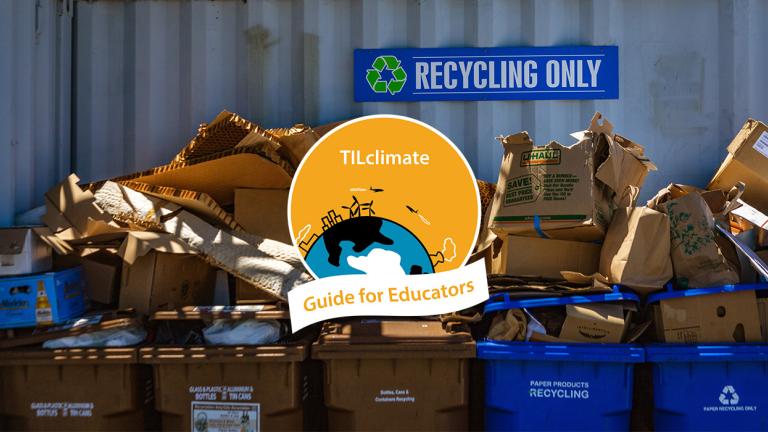
This Guide for Educators was developed by the MIT Environmental Solutions Initiative as an extension of our TILclimate (Today I Learned: Climate) podcast, to make it easier for you to teach climate change, earth science, and energy topics in the classroom. It is an extension of the TILclimate episode "TIL about recycling."
Browse all TILclimate guides for educators.
Description
We often hear about the “Three Rs” of environmental solutions, but how does recycling help climate change? Students engage in a design challenge, research recycling in their own community, and investigate US municipal solid waste data.
SWBAT
- Brainstorm and investigate solutions beyond ‘just recycle more’.
- Explain the link between recycling and climate change.
- Understand where recycling in their own community goes.
Skills
- Design Process
- Communication
- Graph and data reading
Standards:
- HS-ESS3-2 Evaluate competing design solutions for developing, managing, and utilizing energy and mineral resources.
- HS-ESS3-4 Evaluate or refine a technological solution that reduces impacts of human activities on natural systems.
- HS-ETS1-2 Design a solution to a complex real-world problem by breaking it down into smaller, more manageable problems that can be solved through engineering.
- HS-LS2-7 Design, evaluate, and refine a solution for reducing the impacts of human activities on the environment and biodiversity.
- WHST.9-12.7 Conduct short as well as more sustained research projects to answer a question or solve a problem.
- SL.11-12.5 Make strategic use of digital in presentations to enhance understanding of findings, reasoning, and evidence and to add interest.
Disciplinary Core Ideas:
- ESS2.D Weather and Climate
- ESS3.C Human Impacts on Earth Systems
- ESS3.D Global Climate Change
- ETS1.A Defining and Delimiting an Engineering Problem
- ETS1.B Developing Possible Solutions
What is included in this Educator Guide
- How to use TILclimate Educator Guides (Download)
- Full Educator Guide (Download)
- Includes both Teacher and Student pages
- Includes both Teacher and Student pages
- Teacher pages (Download)
- Includes materials, discussion questions, background resources, and adaptation suggestions for science, social science, and ELA teachers
- Includes materials, discussion questions, background resources, and adaptation suggestions for science, social science, and ELA teachers
- Student pages (Download)
- Communication Challenge: Recycling
- Investigation: Recycling in My Community
- Listening Exercise: Recycling Problems and Solutions
- Group Project: Recycling Solutions
- Data Exploration: Solid Waste
- Reading: Solutions Sorting
Listen to the episode


